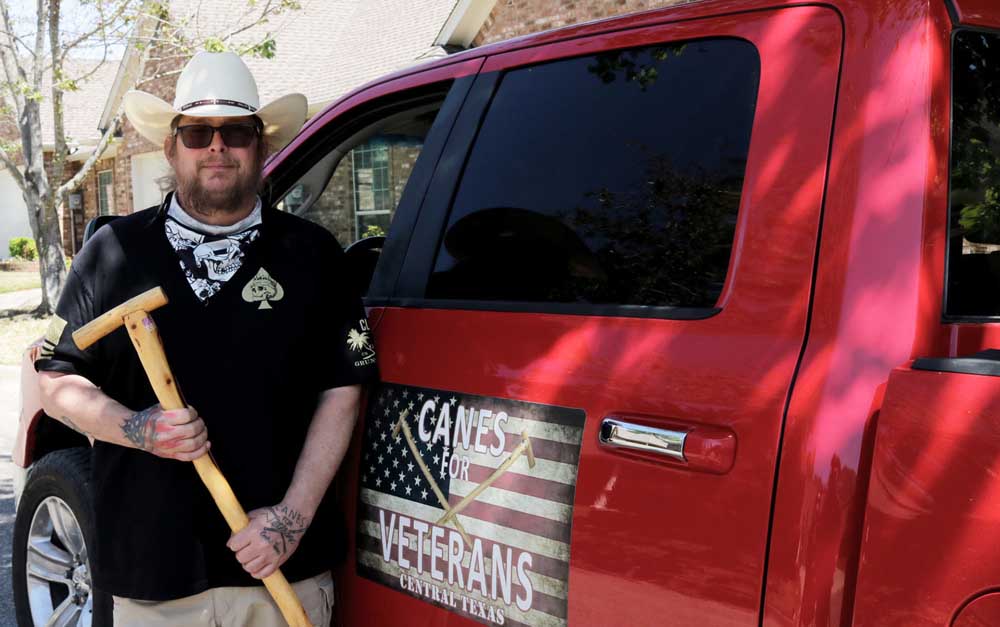Two Tyler veterans receive handcrafted canes from Central Texas nonprofit
Published 6:27 pm Saturday, April 10, 2021

- Canes for Veterans Central Texas founder Jamie Willis poses with his own cane. Willis traveled four hours to give East Texas World War II and Korean War veterans their own personalized canes on Saturday, April 10, 2021.
It was a special day for two Tyler veterans who were honored with a personal delivery of a handcrafted cane from Canes for Veterans Central Texas.
Ardene Hendley, a 96-year-old World War II veteran, and Bobby Tillery, a 90-year-old Korean War veteran, were the two recipients at the small gathering Saturday afternoon.
Trending
Canes for Veterans Central Texas is a nonprofit run by Jamie Willis, who makes walking canes out of old Christmas trees and any kind of wood. The canes are semi-customized and decorated with symbolic stickers.
The nonprofit is based out of Copperas Cove, which is about 10 miles west of Killeen.
“It started with a Facebook post in my local community if somebody was needing a cane,” Willis said.
Until 2019, Willis was making two canes a month. Business began to boom when Willis made a post to social media around Christmas time, asking people not to throw away their Christmas trees, but to donate them to him so that he could make canes for veterans.
Since then, he’s made over 400 canes. There is a waiting list, which takes two years, of about 600 to 800 people.
Hendley and Tillery however, did not wait the two entire years.
Trending
“How it works is if we get a World War II or a Korean veteran that places an order, those automatically go to the top. We don’t have too many World War II or Korean veterans left and I want to get their canes to them as fast as possible,” Willis said.
Over the past years, Canes for Veterans Central Texas has made 12 or 14 canes for World War II veterans and about 25 for Korean veterans across the nation.
“The canes are at no cost. We don’t charge for our canes. It’s a free thing. The only thing that we do is, it’s all donation-run. I’ve never asked anybody to pay for a cane and I never will. I have to use a cane so I know what it’s like and most people that need a cane are on a limited budget anyway. Most of them are retired veterans. They don’t have much money,” Willis said.
“I’m not going to charge somebody for something they need,” he added.
The canes become special for the veterans because according to Willis, the decals and the handmade cane take away from their disabilities and focus on their story.
“The Christmas tree is just like the veteran. They’re taken when they’re young, they’re both pretty much used for a season, and when the government is done with the solider, just like when you’re done using that Christmas tree, they’re thrown out and forgotten about,” Willis said.
“Now I can take that tree again, decorate it back up, give it back to that veteran and show it, just like that veteran, this tree is still strong. It’s still useful, it still has a purpose, just like that veteran. The veteran is still strong, still useful, still has a purpose,” he said.
Usually, Canes for Veterans Central Texas would ship a cane. However, since their drive was only four hours, Willis decided to drive to Tyler.
“We don’t normally get to meet the recipients. Especially with them being a World War II veteran and a Korean veteran, it was special for us to actually get to hand deliver these canes,” Willis said.
As a veteran himself, Willis said this is one way he honors those who have served.
“With the two gentlemen that just received their canes today, you could see the smile on them, ‘Knowing somebody thought about me’ and it made them perk up a little bit. It gives them a little bit of pride back,” he said.
Canes for Veterans gathers as much information from the veteran as they can. They add the branch of service, badges, years they served and more. The trademark is a bullet casing, which is included in each cane.
Hendley and Tillery each had their own personalized touches from Canes for Veterans Central Texas.
While Hendley served in World War II from 1943 to 1946, he lost 44 men one night as a ship blew up while the men were loading ammo. He told the story with tears in his eyes and a broken voice.
Tillery served from 1952 to 1954. After training, he was sent directly to Korea, where he was in the 27th infantry regiment. He was a 50-caliber machine gunner. The only injury he received was damage to his ears, which affects his hearing.
Hendley and Tillery said they were appreciative of the work he was doing and his nonprofit’s mission.







